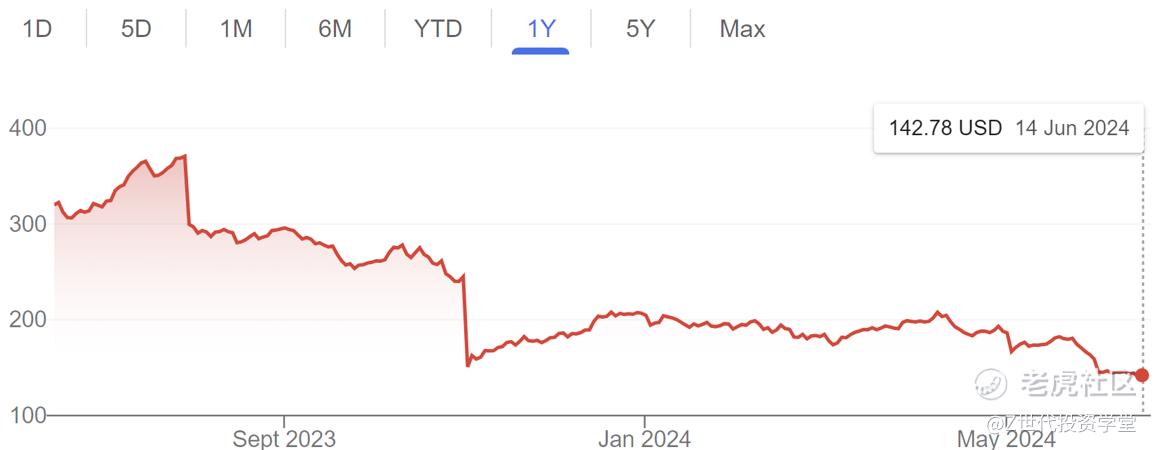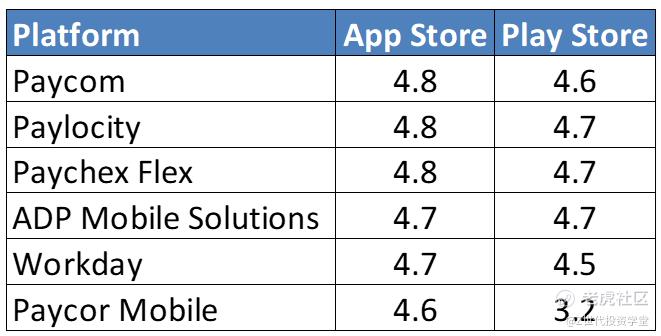Initial Report(part2): Paycom Software Inc (PAYC), 121% 5-Year Potential Upside (VIP, Javier CHAN)
4. PAYC Set-up (-30% YTD)
PAYC stock is down -55% in the past twelve months. In 3Q23, the company missed guidance for the first time in history and provided weak guidance for 2024 sales and EBITDA. In 4Q23, they beat earnings and topline guidance was in line with the street, but margin guidance came up short of consensus, sparking another sell-off. Latest 2024 guidance implies 10-12% y/y revenue growth and a -370bps contraction in EBITDA margin.
Weakness in sales growth stems from two issues: (1) revenue cannibalization from Beti adoption, and (2) weak client net-adds. While these issues have presented about a 10-15% headwind to prior sales expectations, these effects are likely temporary, and we should soon see an inflection point where PAYC returns to higher growth.
5. Investment Thesis
The adoption of Beti has created some headwinds with regards to cannibalization and weak client net adds. The market is treating these as structural problems with the business, but deeper scrutiny would reveal that these headwinds are most likely temporary (and necessary); improvements in business economics will be backloaded.
What is Beti?
Beti is Paycom’s industry-first automated payroll solution that empowers employees to process their own payroll directly within Paycom's unified HCM software platform. It fundamentally changes the traditional payroll approach by putting the responsibility and verification process into the hands of employees themselves.
At the start of each pay period, Beti automatically pulls in live data on employee hours worked, approved expenses, compensation changes, and other payroll-related information from across Paycom's integrated modules like time and attendance, benefits administration, and more. Employees can then review, troubleshoot, and approve their own payroll details before final submission, ensuring greater accuracy and engagement. Beti guides employees through this self-service process, identifying potential errors or missing information that needs to be addressed upfront. This streamlined, employee-driven payroll experience increases efficiencies, reduces processing time, and minimizes costly payroll mistakes for the employer.
Before Beti, employers would have to import files from each of the different systems like compensation adjustments, bonuses, spot bonuses, time and attendance. They would create each import file and manually import it into payroll. For enterprise customers, they might have to do this 100,000 times. The architecture wasn't there so they had to go into each business individually in their dropdown and repeat the process.
Beti automates creating and pulling in all of those different pieces of information into payroll. With that, everyone benefits. Companies with multiple businesses benefit way more than if you only have one business where instead of it taking 30 seconds, it takes zero seconds because it's scheduled.
Quantifying Beti’s Economic Value
A study conducted by Forrester Consulting revealed that Beti reduced time spent correcting payroll errors by 85%, lowered labor for payroll processing by 90%, saved HR and accounting teams over 2,600 hours per year, and saved employers $3,775,365 over three years.
At the same time, Beti empowers HR to break out of the weekly payroll cycle to focus on more important tasks like performing investigations, entering new markets, fostering diversity, equity and inclusion, researching compliance trends, and building out additional benefits for employees. Nucleus Research found that on average, payroll administrators using unautomated systems spent eight hours per 100 employees reconciling errors each pay period.
Beti is also used as an employee engagement and retention tool; employee retention is a big challenge for many companies. “The longevity of my employees at the sites that have the full Paycom experience has increased from nine months to 16 months on average,” said a payroll manager in the manufacturing industry. “Those employees are staying 75% longer.”
Reviews
Beti’s reception so far has been largely positive – their app has a 4.8/5.0 rating on the iOS App Store and 4.6/5.0 on the Google Play Store. For reference, Netflix has 3.6/5.0 on both iOS and Android. Beti has also proven to be a stickier product, with management calling out a 99% retention rate, compared to overall Paycom revenue retention at 90%. The adoption of Beti should be a structural tailwind for overall retention at Paycom.
Cannibalization Issue
While Beti has seen successful adoption, the same success has been a double-edged sword for Paycom. Due to Beti’s ability to bring error rates down to near zero, Paycom had to forgo some transaction-based revenues that were attributed to the correction of certain errors. (E.g. unscheduled payroll, missed expense reimbursements, not having the correct overtime hours recorded etc.) This cannibalization was estimated to bring about 10-15% headwinds to revenues. Essentially, Paycom (and the rest of the industry) previously made good money selling the “cure”, but now Paycom is focused on selling the “prevention”, which is an attractive long-term value proposition.
Another source of revenue headwinds was from Client Relation Representatives (CRRs), the sales team in charge of cross-selling, being overly focused on converting the existing client base to Beti instead of doing their previous job of cross-selling additional modules. Since Beti’s release, the internal mandate was to focus on converting clients to Beti; modules were not allowed to be cross-sold to clients who were not on Beti, rationale being Beti was the key to increasing client stickiness, so that was the product they had to push first. To incentivize CRRs to sell Beti, management set the commissions for Beti at 3x the usual rate as it was a lower revenue product. 75-80% of what CRRs made were from commissions, so selling Beti became more lucrative for them. This also explains the weak 0.7% net client growth in 2023, as CRRs were busy converting the existing client base instead of focusing on base expansion, which was not necessarily revenue generative. Management estimates that these CRR headwinds caused them to leave ~$15-20 million on the table in 2023.
The Silver Lining for Paycom
With the transition from the legacy platform to Beti stirring up so many headwinds, investors have become skeptical about Paycom’s aggressive push for Beti conversions. My view is that this is going to be a long-term story – Beti has proved to be a sticky product with a strong value proposition, and what Beti is for Paycom is that it is a differentiated product in a industry that provides a highly commoditized service. For competitors, most are offering similar services that have little point of differentiation. This was the case for Paycom as well before the launch of Beti in 2021.
With a stronger and stickier base, it is likely that Paycom will eventually be able to make up for the loss in “error” revenues by resuming the cross-selling of modules. Clients that were paying for the legacy product had already exhibited the willingness to spend a higher amount on the legacy platform (including error fees), so cross-selling to these clients will be low-hanging fruit as it is essentially just redirecting their spends towards a more value-added service, rather than just spending it on correcting errors.
With 70%+ of Paycom’s client base already on Beti, it is likely that they will soon divert their efforts back towards cross-selling. In their 1Q24 earnings call, management’s tone was that they were deemphasizing Beti conversions for CRRs moving forward. Furthermore, the remaining “error” revenues make up only 5% of total revenues, so any further headwinds should be marginal.
Beti is also helping Paycom to generate leads. They are getting leads from employees that use Beti at their company and are getting accustomed to managing all HR related tasks from one system. Once an employee gets used to doing everything themselves, they don’t do well going backwards in technology. When they go to another company that has multiple products, multiple logins in which often times it's duplicative effort on their part, they are more likely to desire the simplicity and convenience of Paycom, thus they become long-term advocates for the business. 5 years ago. Paycom had 0 employee referrals, now they get thousands of leads.
Paycom currently only has a TAM penetration of ~5%, and the industry is still dominated by legacy players, so there is no worry about saturation. Despite a messy transition, Beti will eventually help Paycom to increase the lifetime value (LTV) of clients, as clients will stay for longer and develop higher dependence on their platform which will grant Paycom greater pricing power. Paycom will emerge with a stickier product with structural growth tailwinds. As the dust settles, Paycom should be able to bring higher client net adds, and continue to exploit the existing client base with improved monetization and further cross-selling. Their move upmarket should also contribute materially to ARPU growth as they target larger companies with more employees.
Paycom’s Counter-positioning Moat
Beti effectively crafted a moat for Paycom as the business model of offering a “prevention” is starkly different from their competitors’ models of offering the “cure”. While the transition has created temporary headwinds for growth, Paycom biting the bullet early on will make the longer-term story more compelling as this becomes a counter-positioning play, rather than the pure sales and marketing game that the other competitors are partaking in.
*Do note that all of this is for information only and should not be taken as investment advice. If you should choose to invest in any of the stocks, you do so at your own risk.
Disclaimer: Investing carries risk. This is not financial advice. The above content should not be regarded as an offer, recommendation, or solicitation on acquiring or disposing of any financial products, any associated discussions, comments, or posts by author or other users should not be considered as such either. It is solely for general information purpose only, which does not consider your own investment objectives, financial situations or needs. TTM assumes no responsibility or warranty for the accuracy and completeness of the information, investors should do their own research and may seek professional advice before investing.





